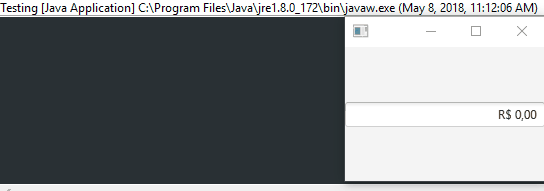Fiz uma solução que resolve parcialmentepequena extensão para o problema, ainda precisa de alguns ajustes ..TextField do JavaFX que formata como se fosse um campo monetário. Estou utilizando Double nesta solução mas você pode alterar como te convenha:
import java.text.NumberFormat;
import java.util.Locale;
import javafx.application.Platform;
import javafx.beans.property.SimpleDoubleProperty;
import javafx.beans.value.ChangeListener;
import javafx.beans.value.ObservableValue;
import javafx.geometry.NodeOrientation;
import javafx.scene.control.TextField;
/**
* Simple Currency Field for JavaFX
* @author Gustavo
* @version 1.0
*/
public class CurrencyField extends TextField{
private StringNumberFormat baseTextformat;
= "000"; private SimpleDoubleProperty amount;
private
String actualText; public CurrencyField(Locale locale) {
private NumberFormat format; this(locale, 0.00);
}
public CurrencyField(Locale locale, Double initialAmount) {
setNodeOrientation(NodeOrientation.RIGHT_TO_LEFT);
amount = new SimpleDoubleProperty(this, "amount", initialAmount);
format = NumberFormat.getCurrencyInstance(locale);
setText(format.format(Double.parseDouble(baseText)initialAmount));
// Remove selection when textfield gets focus
focusedProperty().addListener((ObservableValue<? extends Boolean> observable, Boolean oldValue, Boolean newValue) -> {
Platform.runLater(() -> {
int lenght = getText().length();
selectRange(lenght, lenght);
positionCaret(lenght);
});
});
// Listen the text's changes
textProperty().addListener(new ChangeListener<String>() {
@Override
public void changed(ObservableValue<? extends String> observable, String oldValue, String newValue) {
ifformatText(newValue);
!= null && !newValue }
});
}
/**
* Get the current amount value
* @return Total amount
*/
public Double getAmount() {
return amount.isEmptyget();
}
/**
* Property getter
* @return SimpleDoubleProperty
*/
public SimpleDoubleProperty amountProperty() {
return this.amount;
}
/**
formatText * Change the current amount value
* @param newAmount
*/
public void setAmount(newValueDouble newAmount) {
if(newAmount >= 0.0) {
amount.set(newAmount);
formatText(format.format(newAmount));
}
}
}/**
* Set Currency }format
* @param locale
*/
public void setCurrencyFormat(Locale locale); {
format = NumberFormat.getCurrencyInstance(locale);
formatText(format.format(getAmount()));
}
private void formatText(String text) {
actualTextif(text != null && !text.isEmpty()) {
String plainText = text.replaceAll("[^0-9]", "");
while(actualTextplainText.length() < 3) {
actualText plainText = "0" + actualText;plainText;
}
}
StringBuilder builder = new StringBuilder(actualTextplainText);
builder.insert(actualTextplainText.length() - 2, ".");
Double newValue = Double.parseDouble(builder.toString());
amount.set(newValue);
setText(format.format(DoublenewValue));
}
}
@Override
public void deleteText(int start, int end) {
StringBuilder builder = new StringBuilder(getText());
builder.parseDoubledelete(start, end);
formatText(builder.toString()));
selectRange(start, start);
}
}
Editarei posteriormente com uma correçãoBasicamente ele pega o impute e formata para moeda usando o problemaNumberFormat a partir de um locale. O método formatText(String) remove tudo que ocorre ao deletarnão é número do texto e acrescentando comentários pertinentescoloca um ponto em duas casas decimais, preenchendo com zeros à esquerda caso o número seja pequeno. Abaixo um exemplo de uso:
CurrencyField cur = new CurrencyField(new Locale("pt","BR"));
// Usando esta property você pode ver as mudanças no valor do textfield
cur.amountProperty().addListener(new ChangeListener<Number>() {
@Override
public void changed(ObservableValue<? extends Number> observable, Number oldValue, Number newValue) {
System.out.println(newValue.doubleValue());
}
});

Talvez tenha alguns bugs que eu não notei, qualquer coisa sinalize para ajudar a melhora-lo!